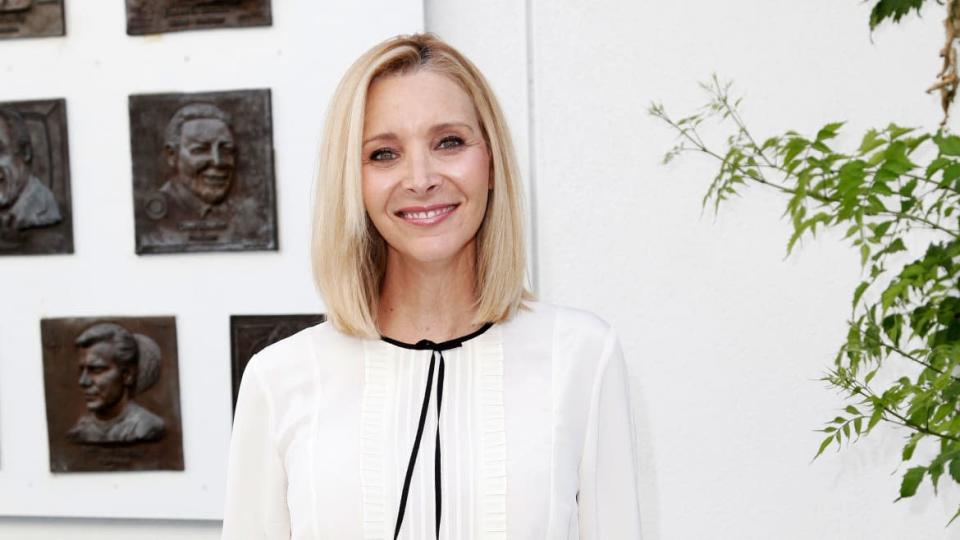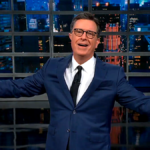
After spending a sizable chunk of the pandemic “watching a lot of TV,” from the entirety of Everybody Loves Raymond (which she’d never seen before and deems “time well-spent”) to reality-TV offerings like The Real Housewives of Beverly Hills, Below Deck, and, in particular, Married at First Sight, and seeing her son graduate from USC, Lisa Kudrow was a bit nervous about her future job prospects.
“I wondered what was in store for a woman of my age,” she says with a chuckle.
The answer, of course, was plenty.
Kudrow, who is 59 (yet looks two decades younger), is back producing her hit genealogy series Who Do You Think You Are?, which returned to its original network, NBC, for its 11th season. The show features celebrities—with the help of a historian—tracing their family tree, often traveling to their ancestral lands. One of the standout episodes thus far saw Nick Offerman learning that his eight-times great-grandmother ran a tavern in the 1700s where she would get members of the Mohawk tribe drunk and trick them into signing over deeds to their land.
There was also the Emmy-nominated Friends reunion, which aired on HBO Max last year; a supporting role in the feel-good Disney+ film Better Nate Than Ever, and a starring one in The Parenting, an upcoming horror-comedy with Edie Falco and Parker Posey about a couple who rent a home in the countryside with their parents only to have one of them (Brian Cox of Succession) be possessed by a 400-year-old demon.
This Season of ‘Below Deck Mediterranean’ Is Painfully Bad
The Daily Beast caught up with Kudrow over coffee—tea for her—to discuss how booked and blessed she is, her desire for a third season of The Comeback, and much more.
What attracted you to a show about genealogy? Was that a journey you yourself went on at some point?
No. My father did a lot of that stuff, and I wasn’t very interested in these names and dates. I didn’t really care. But when I saw this show, it personalized all of it while personalizing history. You were able to get an inkling of your family as human beings—the things that they endured, the things that they saw, and the things that they overcame. The stories are all really emotional.
I do believe things are passed down from generation to generation. When it comes to the Jews, there seems to be a degree of trauma that’s passed down, and often it’s dealt with through comedy.
Yeah. That’s a good coping mechanism. A great way of coping. It used to be in the ’70s you had the “neurotic Jew,” you know? What happened to that word? That was a great word! Now, we have subcategories of real mental illness. But, I mean, there’s also such a thing as that. And then you get into epigenetics, and I think there’s something there too. I don’t know why I have certain fears and things that are irrational, but I could see where it’s something that was experienced by ancestors.
You learned something quite horrific about your great-grandmother on the show [that she was murdered in Belarus during the Holocaust].
And they left out that her adult kids were there too with some of their kids. That was tough, I have to say. By the end of that, I thought, “OK, I have one more day. Just one more day. Go on. Keep breathing. You’re bearing witness, because there are still people that believe this didn’t happen.”
Which is honestly insane.
Yeah, right. There’s actual archaeological evidence. There are bones.
Lisa Kudrow as Phoebe Buffay in Friends
” data-src=”https://s.yimg.com/ny/api/res/1.2/0hXaoJtaVn69bW3CAs.eIg–/YXBwaWQ9aGlnaGxhbmRlcjt3PTk2MDtoPTEyMTI-/https://s.yimg.com/uu/api/res/1.2/.2qGqpDb_583v1N.xtHQZw–~B/aD0xNDc3O3c9MTE3MDthcHBpZD15dGFjaHlvbg–/https://media.zenfs.com/en/thedailybeast.com/524b414eadba172dfa8f245c05111868″><img alt="
Lisa Kudrow as Phoebe Buffay in Friends
” src=”https://s.yimg.com/ny/api/res/1.2/0hXaoJtaVn69bW3CAs.eIg–/YXBwaWQ9aGlnaGxhbmRlcjt3PTk2MDtoPTEyMTI-/https://s.yimg.com/uu/api/res/1.2/.2qGqpDb_583v1N.xtHQZw–~B/aD0xNDc3O3c9MTE3MDthcHBpZD15dGFjaHlvbg–/https://media.zenfs.com/en/thedailybeast.com/524b414eadba172dfa8f245c05111868″ class=”caas-img”>
Lisa Kudrow as Phoebe Buffay in Friends
Reisig & Taylor/NBC via Getty
There was that whole controversy on Finding Your Roots, where Henry Louis Gates was asked by Ben Affleck to have his ancestor’s slave-owning past edited out of the show. Have you ever had to contend with something like that on your show from a star?
Well, we talk to them first to see what they can handle—because this isn’t just sitting and listening to information, this is actually going and, with a historian, interpreting what they’re hearing. It’s not a news show. We’re telling a meaningful story about an ancestor to someone.
I read that you had a bat mitzvah and I’m curious what you did for it.
Well, we didn’t belong to a temple. My father was not religious, as a man of science and all that. But we had a friend who was a rabbi and I wanted to be bat mitzvah’d, so he got me tapes so I could learn it. We couldn’t have a celebration at the temple because we didn’t belong, but he had me and my immediate family come and I was bat mitzvah’d. And then there was a party at my mother’s uncle’s country club, which was nice of them to do. I thought, “All my friends are having bar and bat mitzvahs and I’m Jewish too.” It was as simple as that.
You want to fit in at that age.
It went deeper than just fitting in, because I didn’t really fit in. I didn’t have a ton of friends. It really was a thing of identification for me, and I was starting to light Shabbat candles around that time—alone in my room so as not to bother anybody, because my dad didn’t like that stuff. I was really interested in being Jewish. My husband is not Jewish and our son, he went to a Jewish preschool because it was a nice one, and he was 3 years old and they were saying, “You’re a nice Jewish boy,” and he said, “No! I’m just a boy! We’re just boys and girls!” He didn’t like that extra label. So I just thought, I’m not adding Hebrew school to his schooling.
[embedded content]
I’m curious what you were like growing up. I sort of went through phases, as most kids do. At one point I was very into punk music…
…Oh, you were? I didn’t love punk. I loved new wave. Whatever Elvis Costello was, because that was ’78 and I was in high school. That was mind-blowing, this is it for me. And then there was Bowie, New Order, Aztec Camera. I wore vintage clothing in high school. That’s what it was about. I could’ve looked like Annie Potts in Pretty in Pink—or at least that was the goal, although I didn’t have that body.
Speaking of high school, two films you were in that hit me at just the right time were Romy and Michele’s High School Reunion and The Opposite of Sex, which came out when I was 12 and 13, respectively. And this year is the 25th anniversary of Romy and Michele’s.
Yeah!
I saw Romy and Michele’s in theaters, and it’s become a huge cult favorite. I imagine you couldn’t have seen that coming. And now Alan Cumming has Club Cumming in the East Village, where he’s incorporated some elements from the film into it.
We had no idea, and it is funny because it’s character-driven. At its core are these friends, and everyone can identify with not fitting in, and making the mistake of lying in order to fit in—and what a lame lie! Just plain old stupid.
One of the great movie lies.
It really was! But I never think, “Oh, this is gonna be big.” I don’t have those predictions when I do something. I just hope people will like it, and you never know what’s going to happen. If there had been a big mass shooting at a high-school reunion right before it came out, then it wouldn’t have gone so well. But I’m glad. Why wouldn’t I be? Of course I am!
It’s such a joyful film and I think that’s why people still love it so much. And it doesn’t follow the traditional path of a rom-com. The “traditional” route would have been having Romy and Michele end up with men, and then they ride off into the sunset.
“We’re all set now!” [Laughs] Right.
But they end up together with an even stronger friendship and a successful business, and that’s the journey.
That was really important to [screenwriter] Robin Schiff. And another thing that I know was important to her is that their lie gets found out almost immediately, like, no! This guy invented [Post-its]! At the time, I just did it for fun. I didn’t think it was this great feminist piece. But now I do. It’s two women whose relationship with each other is the most important thing, and guys aren’t going to get in the way of that.
Do you just get sent free boxes of Post-its at this point?
[Laughs] No, absolutely not.
They should be sending you and Mira boxes of these! You did the best promo ever for it.
Oh, absolutely they should. I have to pay money for them like everyone else. I really didn’t complain!
Have you had a wild night out at Club Cumming?
No! It’s here [in New York City], isn’t it? He’s so great. I hope we do a sequel, because it would be fun just to work with Alan [Cumming] and Janeane [Garofalo] again.
And you can have Justin Theroux return as the sexy cowboy.
I know! If he has time!
Lisa Kudrow and Mira Sorvino attend the Romy and Michele’s High School Reunion premiere on April 25, 1997, in Sherman Oaks, California.
” data-src=”https://s.yimg.com/ny/api/res/1.2/kl9yqwiAPQB7V9vbPri2NA–/YXBwaWQ9aGlnaGxhbmRlcjt3PTk2MDtoPTYxNw–/https://s.yimg.com/uu/api/res/1.2/cMcSkac9mY_GMazdXYIrkA–~B/aD03NTI7dz0xMTcwO2FwcGlkPXl0YWNoeW9u/https://media.zenfs.com/en/thedailybeast.com/f014e19280a887b195b91d9fa5e541b2″><img alt="
Lisa Kudrow and Mira Sorvino attend the Romy and Michele’s High School Reunion premiere on April 25, 1997, in Sherman Oaks, California.
” src=”https://s.yimg.com/ny/api/res/1.2/kl9yqwiAPQB7V9vbPri2NA–/YXBwaWQ9aGlnaGxhbmRlcjt3PTk2MDtoPTYxNw–/https://s.yimg.com/uu/api/res/1.2/cMcSkac9mY_GMazdXYIrkA–~B/aD03NTI7dz0xMTcwO2FwcGlkPXl0YWNoeW9u/https://media.zenfs.com/en/thedailybeast.com/f014e19280a887b195b91d9fa5e541b2″ class=”caas-img”>
Lisa Kudrow and Mira Sorvino attend the Romy and Michele’s High School Reunion premiere on April 25, 1997, in Sherman Oaks, California.
Ron Galella/Getty
People forget that he’s in Romy and Michele because you never see his face.
I remember Janeane going, “Have you met Justin? He’s playing the cowboy guy.” And I go, “Oh no, I haven’t.” And she goes, “Oh, he’s totally cool. He’s smart, he’s a writer, and completely hilarious. You’ve got to meet him.” And I said, “Hi, how are you?” And that was it.
It must have surreal when, nearly two decades later, you’re sitting at the wedding of Justin the sexy cowboy and your Friends co-star Jennifer Aniston. Talk about worlds colliding.
I forgot that I met him! Because then he was “Justin Theroux” in Wanderlust with her, and they’re dating, and I’m like, that’s so great! And then I’m saying hi and he’s like, “This is amazing,” and I’m like, “Oh yeah! Romy and Michele’s! That’s right! I know you! I’m so happy!” That was not long before the wedding.
Speaking of Friends, what do you think has been to key to its longevity? You all did seem to get along so well.
We really did.
I don’t think you’ll ever see the entire main cast of a hit show negotiate together to all be paid the same salary again.
No, I don’t think that will ever happen again. It has happened a couple of times. But for me, the thing I think we should get the most credit for is the relationship we created amongst the six of us. It was really respectful. If somebody said something and you didn’t feel great about it, then you gave them the benefit of the doubt—always. It was a fantastic relationship that we all got to experience.
Did you all feel competitive with Seinfeld at the time? I’m not sure we’ll ever see two shows on the same network like that that are behemoths, and the top two shows in the country.
No. I did not at all. Not to take anything away from the writing on Friends, or the cast, or how good Friends really was, but the first season our ratings were just fine. We held onto enough of Mad About You and starting building, but it was in the summer when we were in reruns after Seinfeld, where Seinfeld was our lead-in, where we exploded. I remember going to some party and Jerry Seinfeld was there, and I said, “Hi,” and he said, “You’re welcome.” I said, “Why, thank you… what?” And he said, “You’re on after us in the summer, and you’re welcome.” And I said, “That’s exactly right. Thank you.”
Lisa Kudrow and the cast of Friends reunited in Friends: The Reunion
” data-src=”https://s.yimg.com/ny/api/res/1.2/Gb3KZRlIdfteN200ae5z7g–/YXBwaWQ9aGlnaGxhbmRlcjt3PTk2MDtoPTY0MA–/https://s.yimg.com/uu/api/res/1.2/QaM9Y2s9YGqbAQwzEAyhRQ–~B/aD03ODA7dz0xMTcwO2FwcGlkPXl0YWNoeW9u/https://media.zenfs.com/en/thedailybeast.com/57bbded1f1ff55a229a252db455c5f20″><img alt="
Lisa Kudrow and the cast of Friends reunited in Friends: The Reunion
” src=”https://s.yimg.com/ny/api/res/1.2/Gb3KZRlIdfteN200ae5z7g–/YXBwaWQ9aGlnaGxhbmRlcjt3PTk2MDtoPTY0MA–/https://s.yimg.com/uu/api/res/1.2/QaM9Y2s9YGqbAQwzEAyhRQ–~B/aD03ODA7dz0xMTcwO2FwcGlkPXl0YWNoeW9u/https://media.zenfs.com/en/thedailybeast.com/57bbded1f1ff55a229a252db455c5f20″ class=”caas-img”>
Lisa Kudrow and the cast of Friends reunited in Friends: The Reunion
Terence Patrick/HBO Max
I imagine you must have been approached for a Friends movie a bunch over the years.
For Friends? Never! Marta [Kauffman] and David [Crane] would be approached, but none of us would think of moving without them. But they always thought, “No, no. Here’s what we did. This is what we had for you.”
It’s interesting, because Friends was such a big hit and there have been, for example, two Sex and the City movies.
Yeah, but that’s different. That was single-camera, so it was already filmic. This was a multi-camera sitcom, and it had a different energy to it. I think if there would ever be anything like that, if Marta and David ever signed off on anything like that, it would have to be a different cast at that age. I think it would need to be more current—and more diverse representation is not a bad idea, you know?
I know Marta recently made the news for donating $5 million to try to make up for the lack of diversity on the show. But how do you feel about the diversity on Friends?
Well, I feel like it was a show created by two people who went to Brandeis and wrote about their lives after college. And for shows especially, when it’s going to be a comedy that’s character-driven, you write what you know. They have no business writing stories about the experiences of being a person of color. I think at that time, the big problem that I was seeing was, “Where’s the apprenticeship?”
Will we see a third season of The Comeback? I know there was nine years between the first two seasons, so next year would be another nine years in between seasons.
I don’t think we’re gonna make it! Not make it ever, but I don’t think we’re gonna make it in nine years. We also don’t know if HBO wants it, by the way. But we haven’t asked. We’re both sort of like, “I’m not gonna ask, are you?” “No, I don’t want to hear ‘no.’” It’s something we love so much. That’s why it took nine years the first time!
Lisa Kudrow as Valerie Cherish in The Comeback
” data-src=”https://s.yimg.com/ny/api/res/1.2/pgl7MBeMlCa1nrtd9iJrnw–/YXBwaWQ9aGlnaGxhbmRlcjt3PTk2MDtoPTcyMA–/https://s.yimg.com/uu/api/res/1.2/1uvbE._nfNh4Jt4luhJU5g–~B/aD04Nzg7dz0xMTcwO2FwcGlkPXl0YWNoeW9u/https://media.zenfs.com/en/thedailybeast.com/a154efa9b14714568b2141392e31b94f”><img alt="
Lisa Kudrow as Valerie Cherish in The Comeback
” src=”https://s.yimg.com/ny/api/res/1.2/pgl7MBeMlCa1nrtd9iJrnw–/YXBwaWQ9aGlnaGxhbmRlcjt3PTk2MDtoPTcyMA–/https://s.yimg.com/uu/api/res/1.2/1uvbE._nfNh4Jt4luhJU5g–~B/aD04Nzg7dz0xMTcwO2FwcGlkPXl0YWNoeW9u/https://media.zenfs.com/en/thedailybeast.com/a154efa9b14714568b2141392e31b94f” class=”caas-img”>
Lisa Kudrow as Valerie Cherish in The Comeback
HBO
I think they would go for it.
We always talk about what it would be. Always. Younger and younger people come up to me and go “The Comeback!” Because they weren’t around when it was on TV and didn’t know what it was like in 2005 when it came out. And I love being her. My God, that’s one of the easiest things to do.
Your sketch in Death to 2020, where you played conservative pundit Jeanetta Grace Susan, who keeps complaining—on every network, and in her bestselling book—that “conservative voices are being silenced,” was such a spot-on parody. How did it come about?
They asked me to, and I read it and thought, “That’s funny, I’ll do it.” And also, by the way: It’s every side. Like, sorry. It’s politics. There’s no virtue there. So at that moment, we were seeing people that were outrageously—and very poorly—conning America. It’s like, if you’re gonna con America, at least be good at it! That is the job of those people, and it’s so funny to me.
It’s always strange to see, say, Fox News hosts pulling down seven to eight-figure salaries on highly watched shows complain about “cancel culture” and being silenced for their views.
Yeah. I’ll say this, though: I don’t like talking politics a lot because no good can come of it, but I also think it’s important to understand that there’s maybe half the country that feels a certain way, and there’s a lot of our country that does watch them and what they say makes sense to them. And then there’s the other half that’s listening to the other side. There’s no virtue in politics, is what I’m saying. But you’ve gotta pay attention.
Get the Daily Beast’s biggest scoops and scandals delivered right to your inbox. Sign up now.
Stay informed and gain unlimited access to the Daily Beast’s unmatched reporting. Subscribe now.




